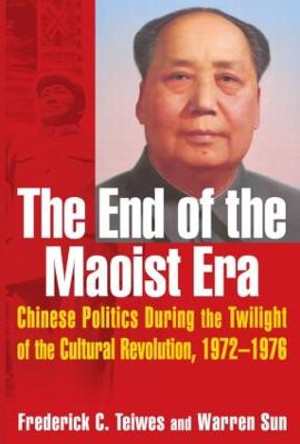Description
The decollectivization of Chinese agriculture in the early post-Mao period is widely recognized as a critical part of the overall reform program. But the political process leading to this outcome is poorly understood. A number of approaches have dominated the existing literature: 1) a power/policy struggle between Hua Guofeng's alleged neo-Maoists and Deng Xiaoping's reform coalition; 2) the power of the peasants; and 3) the leading role of provincial reformers. The first has no validity, while second and third must be viewed through more complex lenses.
This study provides a new interpretation challenging conventional wisdom. Its key finding is that a game changer emerged in spring 1980 at the time Deng replaced Hua as CCP leader, but the significant change in policy was not a product of any clash between these two leaders. Instead, Deng endorsed Zhao Ziyang's policy initiative that shifted emphasis away from Hua's pro-peasant policy of increased resources to the countryside, to a pro-state policy that reduced the rural burden on national coffers. To replace the financial resources, policy measures including household farming were implemented with considerable provincial variations. The major unexpected production increases in 1982 confirmed the arrival of decollectivization as the template on the ground. The dynamics of this policy change has never been adequately explained.
Paradoxes of Post-Mao Rural Reform offers a deep empirical study of critical developments involving politics from the highest levels in Beijing to China's villages, and in the process challenges many broader accepted interpretations of the politics of reform. It is essential reading for students and scholars of contemporary Chinese political history.
About the Author
Frederick C. Teiwes is Emeritus Professor of Chinese Politics at the University of Sydney, Australia.
Warren Sun is Reader in the Chinese Studies Program at Monash University, Australia.
Reviews
"Teiwes (Univ. of Sydney, Australia) and Sun (Monash Univ., Australia) set out dispelling some misunderstandings about China's rural reform in the early post-Mao period (1976-81). For the first two years after Mao's death, Hua Guofeng was the dominant figure in rural policy, steadily moving in a pro-peasant direction. By early 1980, when the political power transition was complete, Deng Xiaoping was as committed to collective agriculture as Hua. Meanwhile, provincial leaders such as Zhao Ziyang and Wan Li were experimenting with de-collectivization policies, namely baochan daohu (contracting production to households). The household responsibility system proved successful as agricultural production increased in the early 1980s. Deng gradually endorsed Zhao's policy initiative and shifted from Hua's pro-peasant policy of increased resources to the countryside to a pro-state policy that reduced rural burden on national coffers, leaving production at the household level. With the empirical study of major developments involving politics from the highest level in Beijing to rural villages, the book captures the dynamics of rural reform in the early post-Mao era. This is a highly informative account of Chinese politics and major decision making as Deng emerged as the supreme leader after Mao."
Z. Zhu, Bucknell University, CHOICE
"One of the core features of Teiwes and Sun's work over the last decades has been to question the story of the demise of Hua Guofeng, and the ineffectiveness of his brief tenure of ultimate power in the People's Republic. Hua was Mao's final chosen successor, and had emerged largely from provincial leadership before catching Mao's eye in his final years. The authors make clear that his relative youth and lack of revolutionary experience compared to Deng meant that his hold on power after the radical Gang of Four were removed from power was always under question."
Kerry Brown, King's College, London
"In sum, a complex and unplanned interplay between the top leadership and provincial and subprovincial levels of the bureaucratic structure, involving ambigious directives from reformers at the top who were hesistantly open to household framing and ongoing pressure among provincial and subprovincial officials to react, gradually culminated in the countryside's near-total abandonment of agricultural collectives. There had been no master plan, no deliberate effort from above to steer all of rural China uniformly down a single path. Yet, due to the nature of Chinese political organiztion and practices, that is precisely what occurred. Over the course of a four-year period all of rural China was launched into an entirely new agrarian order. It was an extraordinary turning point in PRC history. Teiwes and Sun capture this well, showing the important cumulative details of incremental shifts while never losing sight of the broader scenario. The authors deserve applause."
Jonathon Unger, Australian National University, The China Journal, No. 79
"Teiwes and Sun have dismantled a key story about the reform period, and their work should be read by all interested in recent Chinese history or politics, not just those focused on rural issues."
Alexander F. Day, Occidental College, Pacific Affairs, Volume 91, No. 3
"Using a broad range of sources, the authors discuss and revise several established truths about the first stages of rural reform. ... [The book is] full of important arguments and fascinating details that both historians and political scientists will enjoy."
Stig Thogersen, Aarhus University, The China Quarterly, Volume 234
Book Information
ISBN 9780367597351
Author Frederick C. Teiwes
Format Paperback
Page Count 350
Imprint Routledge
Publisher Taylor & Francis Ltd
Weight(grams) 453g




